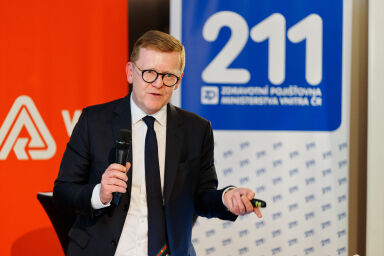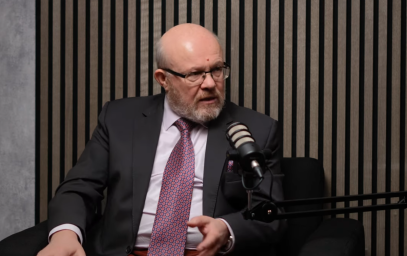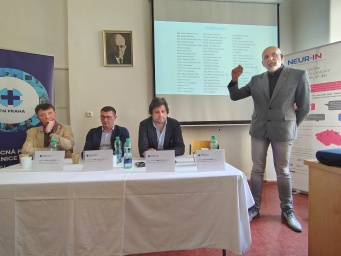The health of the population is of key economic importance for companies and public finances. The private and public sectors should therefore promote prevention and various employee benefits. The participants of the Eurodebate, in which Radim Sršeň, Deputy Minister for Regional Development and STAN candidate to the European Parliament, discussed with experts from various fields, agreed on this. He also described what the Ministry of Regional Development specifically supports and plans to support in the field of health care.
The health of the population is crucial to the competitiveness and productivity of businesses and the national economy, according to European Parliament candidate Radim Sršeň. „Three years ago, McKinsey calculated that sickness-related absenteeism and retirements cost the Czech Republic approximately 700 billion Czech crowns per year. This is a huge figure that only underlines the importance of quality and accessible healthcare, and especially prevention,“ said Sršeň.

In the discussion, he also stressed that a healthy population is key to sustainable long-term growth. „Healthy individuals are generally more satisfied at work, which in turn will be reflected in their work engagement. Conversely, poor health can increase stress and lead to demotivation,“ described Sršeň, who is convinced that companies are also aware of this and therefore support their employees‘ health care, for example by providing suitable benefits.

Health as a basic priority for all inhabitants is of economic importance for companies and public finances, says Bohuslav Čížek, Director of the Economic Policy Section of the Confederation of Industry and Transport. „People are the basic pillar of our companies and it is very difficult to find replacements for workers even in the conditions of our economy if they have health problems and drop out of production. That’s why many of our members also provide preventive programmes for their employees, which is a good way to prevent health problems,“ Čížek told Eurodebate.
Ultimately, he said, such an approach is beneficial for everyone – from the employee to the company to the state. „Unfortunately, the tax package and the taxation of benefits did not help. Negotiations are currently underway where, together with other employers‘ and business associations, we are addressing, for example, the possibility of exempting health benefits from the cap for tax purposes,“ Čížek pointed out.

Not only long, but also quality life
Jiří Kvíz, Vice-Chairman of the Supervisory Board of the Association of Small and Medium-Sized Enterprises and Tradesmen of the Czech Republic, also confirmed in the Eurodebate that the health of the population undoubtedly has a significant impact on the competitiveness of companies. „Of course, this is true even if we ignore emergency situations such as a covid pandemic,“ Kvíz noted. And he said that even today one can regularly encounter companies in which operations are restricted due to illnesses of employees or, for example, children of employees. „This situation is partly solvable in some industries thanks to digitalisation and the possibility of working from home, but in many industries the physical presence of employees is irreplaceable. That is why we see that many employers today include cards allowing access to sports facilities or various rehabilitation and preventive health programmes among employee benefits,“ said Kvíz in the Eurodebate.

Jaromír Hanzal, Director of the Association for Applied Research in IT, reminded the audience that one of the most pressing health problems in the Czech Republic is the low life expectancy in full health. „Although our life expectancy is similar to countries in Western Europe, we are chronically ill much earlier. There is no doubt at all that this problem has a negative impact on our economy,“ said Hanzal. But he added optimistically: „The most important health research projects currently underway in the Czech Republic are directed at lifestyle monitoring, which has a major impact on this.“

Tomáš Pala, external relations director of Zentiva Group, also perceives the fundamental link between the health of the population and the competitiveness of companies and the national economy. „It is known that prevention fundamentally affects health status, length and quality of life. From my point of view, it is necessary to ensure people not only a longer life, but also a high quality of life. This should be a key issue for the health system,“ Pala said in the discussion.
Emphasis on promoting digitalisation
In the Eurodebate, European Parliament candidate Radim Sršeň also talked about healthcare from the perspective of his current role as Deputy Minister for Regional Development (MMR). In describing what the ministry specifically supports and plans to support in the healthcare sector in this programming period, he mentioned that the MMR’s role is mainly related to infrastructure projects, such as the construction and reconstruction of healthcare facilities as part of broader regional development programmes. „The MMR is now placing a significant emphasis on the digitisation of the health sector. The Integrated Regional Operational Programme (IROP), which the MMR manages, has launched three calls to support the digitisation of healthcare. Around CZK 2.4 billion from the European Regional Development Fund (ERDF) will go towards the computerisation of medical records and related services,“ Sršeň described.

He also mentioned that the funds can be used by healthcare institutions to purchase new software tools and to expand existing information systems. „This will allow doctors to access records from virtually anywhere through standard electronic interfaces, portals, mobile and web applications. It also plays an important role in the development of telemedicine, of which I am a big supporter,“ the Deputy Minister explained.
And he added a concrete example. „In our Olomouc Region, we have launched a project to monitor gestational diabetes. Expectant mothers measure their own blood sugar levels and the data is then sent to doctors for evaluation. Patients do not have to travel to the clinic to be examined. This is the principle of telemedicine, to make everyday life easier while ensuring high quality health services,“ Sršeň concluded.
Jakub Němec
Mohlo by vás zajímat
Photo: Radek Čepelák







